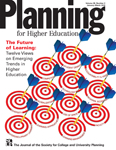- Integrated Planning
Integrated Planning
Integrated planning is a sustainable approach to planning that builds relationships, aligns the organization, and emphasizes preparedness for change.
- Topics
Topics
- Resources
Resources
Featured Formats
Popular Topics
- Events & Programs
Events & Programs
Upcoming Events
- Community
Community
The SCUP community opens a whole world of integrated planning resources, connections, and expertise.
- Integrated Planning
Integrated Planning
Integrated planning is a sustainable approach to planning that builds relationships, aligns the organization, and emphasizes preparedness for change.
- Topics
Topics
- Resources
Resources
Featured Formats
Popular Topics
- Events & Programs
Events & Programs
Upcoming Events
- Community
Community
The SCUP community opens a whole world of integrated planning resources, connections, and expertise.
 Planning for Higher Education Journal
Planning for Higher Education JournalThe Future of Learning
12 Views on Emerging Trends in Higher Education From Volume 38 Number 2 | January–March 2010By William J Flynn, Jeff A. Vredevoogd
From Volume 38 Number 2 | January–March 2010By William J Flynn, Jeff A. VredevoogdIn 2009, Herman Miller, Inc., a Zeeland, Michigan-based furniture manufacturer, convened a leadership roundtable intended to identify trends that would affect higher education in the year 2015. Representatives from research universities, state colleges, community colleges, private institutions, and architectural and design firms participated in the roundtable discussion and, from a series of exercises, determined a list of 12 future trends. Among those trends, the roundtable concluded that globalization will influence and shape all aspects of teaching and learning. Plus, advancements in technology will drive ongoing changes throughout college and university life and offer new opportunities to enhance and broaden learning experiences. Students will take greater control of their own learning as proactive producers and managers of their own learning solutions, materials, and portfolios. Roundtable participants also concluded that the competition for students and resources will force colleges and universities to sharpen their brands and identities and to distinguish themselves in new ways. Lastly, accountability and assessment tools will continue to become common in defining institutional effectiveness. In conclusion, it is important for colleges and universities to be aware of future trends in higher education so that they can provide students and faculty with a strong, resilient, and vibrant academy for generations to come.
MEMBERS ONLY
Attention Members: Log in to access this item.Not a member? Join now to access this article and all journal articles for free. - Topics
- Topics


